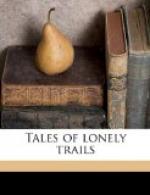My reflection did not carry me at that time to any positive convictions of what was truest and best. The only conclusions I eventually arrived at were that I was sore and bruised and dirty and torn—that I would be happy if the bear got away—that I had lost my mean horse and was glad therefore—that I would have half a dozen horses and rifles upon my next hunt—and lastly that I would not be in any hurry to tell about mistaking a steer for a bear, and climbing a tree. Indeed these last facts have been religiously kept secret until chronicled here.
Shortly afterward, as I was making a lame and slow headway toward Horton Thicket, where I hoped to find a trail out, I heard Edd yelling, and I answered. Presently we met. He was leading my horse, and some of the hounds, notably Old Tom and Dan, were with him.
“Where’s the bear?” I asked.
“He got away down in the breaks,” replied Edd. “George is tryin’ to call the hounds back. What happened to you? I heard you shoot.”
“My horse didn’t care much for me or the brush,” I replied. “He left me—rather suddenly. And—I took a shot at what I thought was a bear.”
“I seen him once,” said Edd, with eyes flashing. “Was just goin’ to smoke him up when he jumped out of sight.”
My mortification and apprehension were somewhat mitigated when I observed that Edd was dirty, ragged, and almost as much disheveled as I was. I had feared he would see in my appearance certain unmistakable evidences that I had made a tenderfoot blunder and then run for my life. But Edd took my loss of hat, and torn coat, and general bedraggled state as a matter of course. Indeed I somehow felt a little pride at his acceptance of me there in the flesh.




